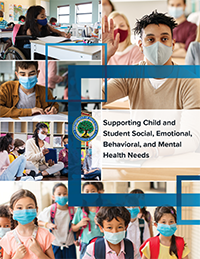
Many children and youth struggle with mental health challenges that impact their full access to and participation in learning, leading to behaviors that are often misunderstood and can be interpreted as inconsistent with school or program expectations. The COVID-19 global pandemic intensified these challenges, accelerating the need to provide school-based mental health support and leverage our accumulated knowledge about how to offer nurturing educational environments to meet the needs of our nation’s youth.
Children and student with disabilities experience higher rates of mental health challenges; more anxiety, depression, and academic-related distress; higher rates of suicide ideation and suicide attempts, and nonsuicidal self-injury; and greater peer victimization when compared with their peers.
This page highlights tools, webinars and online modules from Federally-funded centers that can be used for school- or program-based social, emotional, behavior and mental health initiatives across early childhood settings and K–12 schools. This page also includes links to relevant OSEP-funded Centers that provide various resources on topics related to mental health. These resources can support educators, parents and administrators in implementing evidence-based recommendations and guidance to support social, emotional and mental health services for all children and youth.
Department of Education-Funded Centers
Center to Improve Social and Emotional Learning and School Safety (CISELSS)
The purpose of the CISELSS is to provide technical assistance to support states and districts in the implementation of social and emotional learning (SEL) evidence-based programs and practices.
Center for Parent Information and Resources (CPIR)
CPIR serves as a central resource of information and products to the community of Parent Training and Information (PTI) Centers and the Community Parent Resource Centers (CPRCs), so that they can focus their efforts on serving families of children with disabilities. Users can view their resource library and search by topic.
Comprehensive Center Network (CCNetwork)
CCNetwork comprises 19 regional Comprehensive Centers and one National Center that provide capacity-building technical assistance to states, districts and schools in their design and implementation of evidence-based policies, practices, programs, and interventions that improve instruction and educational outcomes for all students. The CCNetwork produces and disseminates research-based tools and resources to build the capacity of educational leadership in social-emotional, behavioral learning and mental health approaches to better support the well-being of school staff, students, and families.
Early Childhood Technical Assistance Center (ECTA)
The ECTA Center supports State Part C and Section 619 programs in developing high-quality early intervention and preschool special education service systems. ECTA is focused on building state and local system capacity to implement evidence-based practices, and improve outcomes for children with disabilities and their families.
IRIS Center
The IRIS Center is a national center dedicated to improving education outcomes for all children, especially those with disabilities birth through age twenty-one, through the use of effective evidence-based practices and interventions.
National Center for Homeless Education (NCHE)
NCHE operates the Department's technical assistance center for the federal Education for Homeless Children and Youth (EHCY) Program. NCHE works with schools, service providers, parents, and other stakeholders to ensure that children and youth experiencing homelessness can enroll and succeed in school.
National Center on Intensive Intervention (NCII)
The mission of NCII is to build knowledge and capacity of State and local leaders, faculty and professional development providers, educators, and other stakeholders to support implementation of intensive intervention for students with severe and persistent learning and/or social, emotional, or behavioral needs using data-based individualization (DBI). NCII works in conjunction with many of the nation's most distinguished DBI experts.
The National Center for Pyramid Model Innovations (NCPMI)
The National Center for Pyramid Model Innovations (NCPMI) improves and supports the capacity of State systems and local programs to implement the Pyramid Model for Supporting Social Emotional Competence in Infants and Young Children (Pyramid Model), an early childhood multi-tiered system of support (MTSS), with the goal of to improving the social, emotional, and behavioral outcomes of young children with, and at risk for, developmental disabilities or delays.
National Center on Safe Supportive Learning Environments (NCSSLE)
NCSSLE is funded by the Department’s Office of Safe and Supportive Schools. The Center offers information and technical assistance to states, districts, schools, institutions of higher education, and communities focused on improving school climate and conditions for learning. NCSSLE operates under the premise that, with the right resources and support, educational partners can collaborate to sustain safe, engaging, and healthy U.S. Department of Education Supporting Child and Student Social, Emotional, Behavioral, and Mental Health Needs 79 school environments that support student academic success. The website includes information about the Center’s training and technical assistance resources, products and tools, and latest research findings.
National Technical Assistance Center for the Education of Neglected or Delinquent Children and Youth (NDTAC)
NDTAC’s overarching mission is to improve educational programming for children and youth who are neglected or delinquent or at risk. NDTAC focuses on three key goals: Collect and disseminate information and resources related to the education of children and youth who are neglected or delinquent and/or at risk of dropping out of school, Foster coordination and collaboration among neglected or delinquent programs, and Synthesize and provide existing evidence-based research to expand the general knowledge base about the education of children and youth who are neglected or delinquent.
The Center on Positive Behavioral Interventions & Support (PBIS Center)
The PBIS Center supports schools, districts, and States to build systems capacity for implementing a multi-tiered approach to social, emotional and behavior support. The PBIS Center’s mission is to improve social, emotional, and academic outcomes for all students, including students with disabilities and students from underrepresented groups.
PROGRESS Center
The PROGRESS Center (which stands for Promoting Rigorous Outcomes and Growth by Redesigning Educational Services for Students with Disabilities Center) provides information, resources, tools, and technical assistance services to support local educators and leaders (kindergarten through transition age) in developing and implementing high-quality educational programs that ensure students with disabilities have access to free appropriate public education (FAPE) which allows them to make progress and meet challenging goals, consistent with the U.S. Supreme Court’s decision in Endrew F. v. Douglas County School District (2017).
Regional Educational Laboratory Program
The ten Regional Educational Laboratories (RELs) partner with educators and policymakers nationwide. For nearly 60 years, the RELs have collaborated with school districts, state departments of education, and other education stakeholders to help generate and apply evidence, with the goal of improving learner outcomes. REL work is change-oriented, rigorous, and high-leverage, supporting consequential local, regional, or statewide decisions about education policies, programs, and practices. Their website has numerous resources that can be searched by topic, including a section on Social Emotional Learning.
TIES Center
The TIES Center is the national technical assistance center on inclusive practices and policies. It works with states, districts, and schools to support the movement of students with disabilities from less inclusive to more inclusive environments.
Other Federally-Funded Centers
Center of Excellence on Infant and Early Childhood Mental Health Consultation (CoE for IECMHC)
Funded by the U.S. Department of Health and Human Services
The CoE for IECMHC is a national technical assistance center dedicated to the advancement and impact of the field of IECMHC through training, technical assistance, and resource development. The CoE for IECMHC provides technical assistance to programs, communities, states, territories, and tribal communities, and individual mental health consultants to increase access to high quality mental health consultation throughout the country.
National Center on Afterschool and Summer Enrichment (NCASE)
Funded by the U.S. Department of Health and Human Services
The National Center on Afterschool and Summer Enrichment (NCASE) is part of the Office of Child Care (OCC) Technical Assistance network. NCASE provides training and technical assistance to the state, territory, and tribal Child Care and Development Fund lead agencies and their designated networks, which include the statewide afterschool networks, state and local educational agencies, provider associations, and Child Care Resource and Referral agencies. Selected NCASE resources include: social and emotional learning, addressing adverse childhood experiences, supporting positive social-emotional climates in out-of-school time.
National Center on Early Childhood Development, Teaching, and Learning (NCECDTL)
Funded by the U.S. Department of Health and Human Services
This Center is part of a comprehensive Training and Technical Assistance System funded by the Office of Head Start. NCECDTL advances best practices in the identification, development, and promotion of the implementation of evidence-based child development and teaching and learning practices that are culturally and linguistically responsive and lead to positive child outcomes across early childhood programs. It uses professional development strategies that support states, tribes, and agencies in serving low-income families.
National Center on Health, Behavioral Health, and Safety (NCHBHS)
Funded by the U.S. Department of Health and Human Services
This Center is part of a comprehensive Office of Head Start Training and Technical Assistance System and works collaboratively with a consortium of partners. NCHBHS designs evidence-based resources and delivers innovative training and technical assistance to build the capacity of Head Start and other early childhood programs. NCHBHS is responsive to the unique needs of children who are dual language learners, children in Tribal or Migrant and Seasonal Head Start programs, children with special health care needs, and children who are living in foster care or experiencing homelessness.
National Center on Parent, Family, and Community Engagement (NCPFCE)
Funded by the U.S. Department of Health and Human Services
This Center is part of a comprehensive Department of Health and Human Services/Office of Head Start Training and Technical Assistance System. NCPFCE provides training and technical assistance for Head Start and Early Head Start staff who work with families.
National Training and Technical Assistance Center for Child, Youth, and Family Mental Health (NTTAC)
Funded by the Substance Abuse and Mental Health Services Administration
NTTAC provides states, tribes, and communities with training and technical assistance on children’s behavioral health, with a focus on systems of care. NTTAC is funded to increase access to, effectiveness of, and dissemination of evidence-based mental health services for young people (birth to age 21) and their families, including young people experiencing serious mental illness or serious emotional disturbance. NTTAC supports a system of care that is traumainformed and person-centered. NTTAC is committed to equity, inclusion, and diversity, and promotes authentic partnership with youth and families. NTTAC supports Children’s Mental Health Initiative grantees and provides an array of trainings, technical assistance, and resources to providers, organizations, and agencies from across the system of care.
 Supporting Child and Student Social, Emotional, Behavioral, and Mental Health Needs
Supporting Child and Student Social, Emotional, Behavioral, and Mental Health Needs
This resource highlights seven key challenges to providing school- or program-based mental health support across early childhood, K–12 schools, and higher education settings, and also presents seven corresponding recommendations.